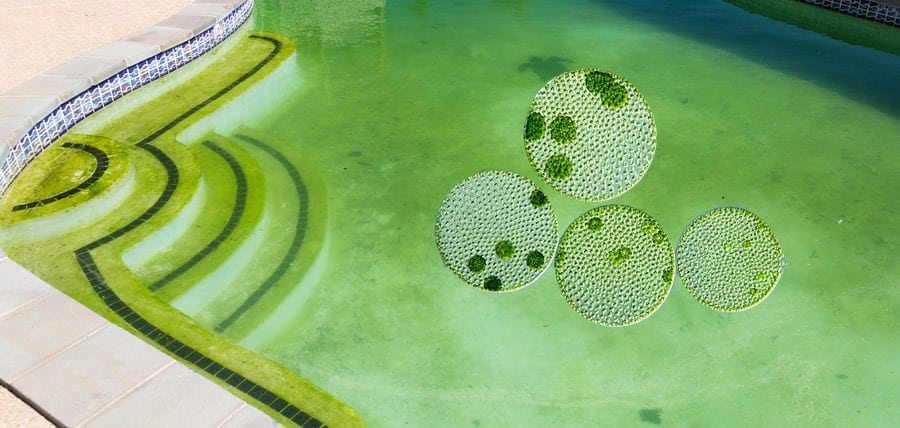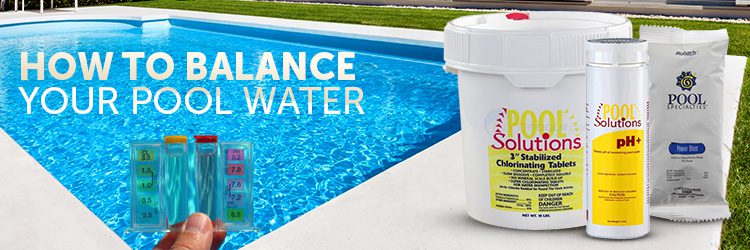Before we dive into the deep end with water chemistry, we first need to talk about what algae are, how it forms, and how you can combat and even prevent it.
What Exactly Are Pool Algae?
To be honest, there are a few things that contribute to pool algae. But, what exactly are pool algae?
Algal blooms are actually just living plant organisms that can inhabit your pool and multiply quickly. Algal blooms use photosynthesis to create their own food. You can find algal blooms in a variety of colors and forms and they are microscopic in size. This means that there could be millions of algal blooms in your pool before you even realize it.
However, unlike the algal blooms you might see in marine water, most pool algal blooms are seemingly harmless to swimmers. Still, that doesn’t mean you want it there or swim in it. In fact, you don’t just want to fight algal blooms, you want to prevent them.
What Causes Pool Algae?
There are many different reasons that can contribute to algae in your pool. To be fair, algae don’t just occur in unhealthy pools. So, if you’re fighting algae right now, don’t be too hard on yourself.
Algae can occur because of many reasons including:
- Unbalanced chemicals
- Hot weather
- Undersized filter
- Undersized pump
- Circulation issues
- pH imbalance
- Dirt, debris, and leaves in the pool
In short, if you own a pool, it’s inevitable that you will see algae at some point.
Why Does My Pool Keep Getting Algae?
Okay, you already know what algae are and you know how it forms, but you’re still wondering why does my pool keep getting algae. To determine the “why” you will have to play the process of elimination. Ask yourself the following questions:
Are my pump and filter the correct size?
It’s important to ensure that your pump and filter are large enough to handle the gallon size of your pool. Are you running your pump long enough? Remember, the rule of thumb is you want to turn over or filter your entire pool within an eight-hour period.
Is my pool equipment in proper working condition?
Sure, you’re running your equipment as normal, but is it running properly? It is crucial to ensure that your pump and filter (and cleaner) are in working condition. For example, if you haven’t backwashed, cleaned, or replaced your filter grids, your pool won’t filter properly. Eventually, you will see algal blooms in your pool if you do not address the issue.
Remember, on your quest to rid algae, the type and the size of your filter play a huge role. Larger filters allow pool owners to go longer periods of time between cleaning. This is especially useful when ridding algae. D.E filters are the best for filtering smaller particles. As a result, it is the best filter to rid your algae.
Are my pool chemicals in balance?
Honestly, pool chemistry is not for the faint-hearted. It may take some trial and error, however, pool chemistry is crucial to the overall health of your pool. So, even if you have a pool technician taking care of your pool, it might be beneficial to write down tips and pointers.
When in doubt, test your water. You can purchase your own testing kit or take a water sample to your local pool store for testing. Once you get your water analysis, you can begin to balance as necessary.
Does my pool need shocking?
In some cases, you will have to shock your pool because simply rebalancing your pool isn’t enough. Shocking your pool, or super chlorinating, is a cleaning method that keeps your pool water clean and safe by adding three to five times the normal amount of chlorine.
The large dose breaks down the combined chlorine, organic waste, and other contaminants in your pool. Additionally, it re-establishes a positive level of free chlorine. This process is not instant and can take several days to conquer.
Am I having circulation issues?
Pool circulation problems oftentimes result in low flow. Low water flow in your pool can affect the performance of your pump and filter. Thus, leading to algae. If you are experiencing circulation issues because of low water flow, there are a few areas around the pool that you can check yourself.
Is my swimming pool clean?
We are not referring to chemical balance when we ask if your pool is clean. We are referring to objects in your pool that you can literally see. Branches, leaves, pollen, dirt, bugs, animal droppings, and random debris all contribute to algal growth. Unnecessary debris mixed with hot weather is a recipe for algae.
When did you scrub your pool walls last? If you honestly can’t remember, then it’s probably time. If you have a pool maintenance person, ask them. Algal blooms have a bad habit of sticking to your pool wall. Brushing your pool walls regularly helps ensure those blooms aren’t forming consistently.
How Much Algae Is Too Much?
In some cases, it’s simply easier to drain your pool and start over than clean the pool. Also, depending on if you have time restraints, this may be a quicker option than cleaning the pool.
If you have any other questions about pool and spa products please do let us know - we are here to help!

